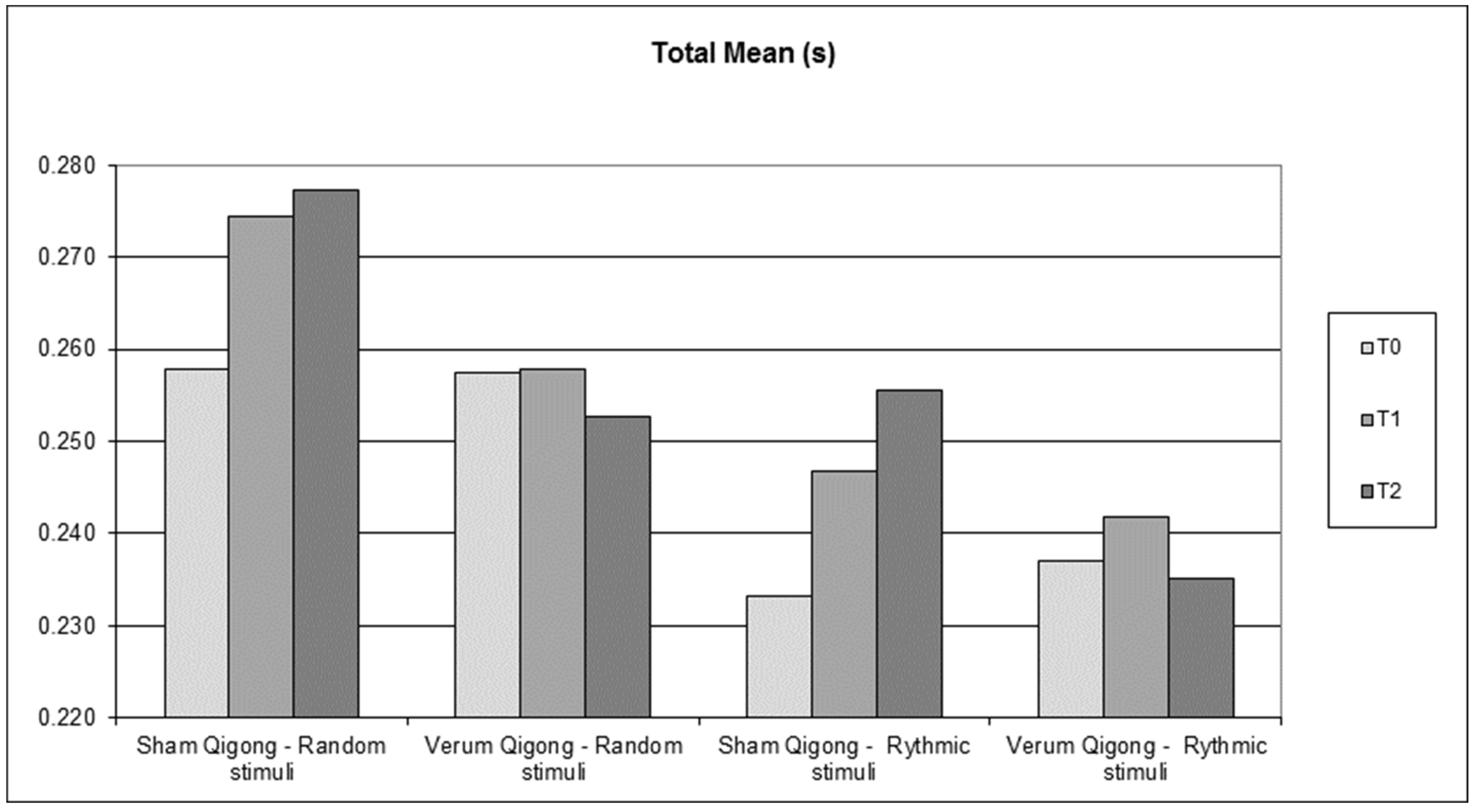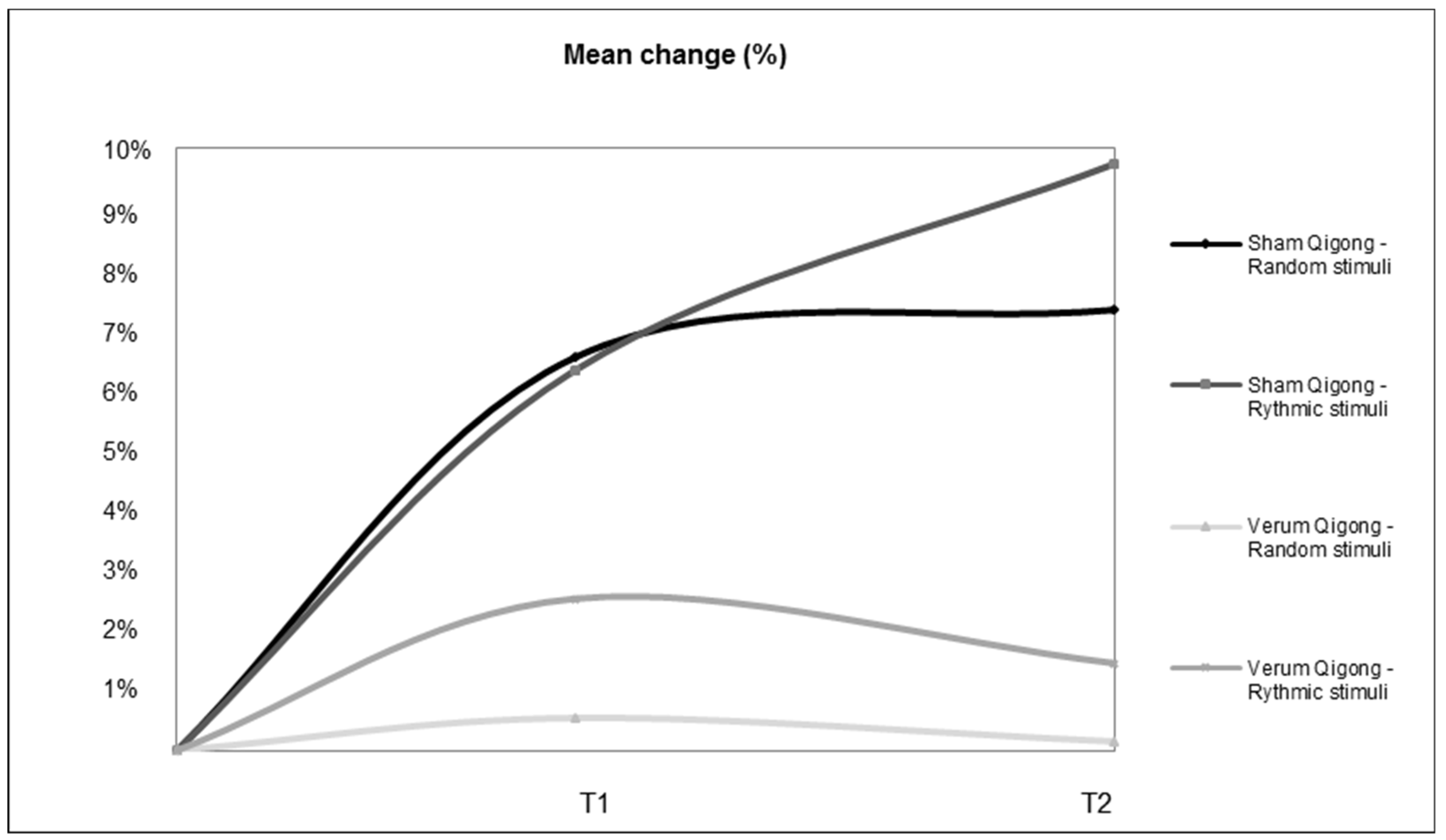Can Qigong Be a Tool to Assist Students in Handling COVID-19’s Resulting Academic Stress?
Abstract
1. Introduction
2. Methodology
3. Results and Discussion
4. Conclusions
Author Contributions
Funding
Institutional Review Board Statement
Informed Consent Statement
Data Availability Statement
Conflicts of Interest
References
- Strong, T.; Sesma-Vazquez, M. Discourses on children’s mental health: A critical review. In The Palgrave Handbook of Child Mental Health; Palgrave Macmillan: London, UK, 2015; pp. 99–116. [Google Scholar] [CrossRef]
- Meherali, S.; Punjani, N.; Louie-Poon, S.; Abdul Rahim, K.; Das, J.K.; Salam, R.A.; Lassi, Z.S. Mental Health of Children and Adolescents Amidst COVID-19 and Past Pandemics: A Rapid Systematic Review. Int. J. Environ. Res. Public Health 2021, 18, 3432. [Google Scholar] [CrossRef] [PubMed]
- Golberstein, E.; Gonzales, G.; Meara, E. How do economic downturns affect the mental health of children? Evidence from the National Health Interview Survey. Health Econ. 2019, 28, 955–970. [Google Scholar] [CrossRef] [PubMed]
- Loades, M.E.; Chatburn, E.; Higson-Sweeney, N.; Reynolds, S.; Shafran, R.; Brigden, A.; Linney, C.; McManus, M.N.; Borwick, C.; Crawley, E. Rapid Systematic Review: The Impact of Social Isolation and Loneliness on the Mental Health of Children and Adolescents in the Context of COVID-19. J. Am. Acad. Child Adolesc. Psychiatry 2020, 59, 1218–1239.e3. [Google Scholar] [CrossRef] [PubMed]
- Stentiford, L.; Koutsouris, G.; Allan, A. Girls, mental health and academic achievement: A qualitative systematic review. Educ. Rev. 2021, 1–31. [Google Scholar] [CrossRef]
- Deb, S.; Strodl, E.; Sun, H. Academic stress, parental pressure, anxiety and mental health among Indian high school students. Int. J. Psychol. Behav. Sci. 2015, 5, 26–34. [Google Scholar]
- Eriksen, I.M. Class, parenting and academic stress in Norway: Middle-class youth on parental pressure and mental health. Discourse Stud. Cult. Politics Educ. 2020, 42, 602–614. [Google Scholar] [CrossRef]
- Qin, L.; Chen, S.; Luo, B.; Chen, Y. The Effect of Learning Burnout on Sleep Quality in Primary School Students: The Mediating Role of Mental Health. Healthcare 2022, 10, 2076. [Google Scholar] [CrossRef]
- Meylan, N.; Meylan, J.; Rodriguez, M.; Bonvin, P.; Tardif, E. What Types of Educational Practices Impact School Burnout Levels in Adolescents? Int. J. Environ. Res. Public Health 2020, 17, 1152. [Google Scholar] [CrossRef]
- Farina, E.; Ornaghi, V.; Pepe, A.; Fiorilli, C.; Grazzani, I. High School Student Burnout: Is Empathy a Protective or Risk Factor? Front. Psychol. 2020, 11. [Google Scholar] [CrossRef] [PubMed]
- Delardas, O.; Kechagias, K.S.; Pontikos, P.N.; Giannos, P. Socio-Economic Impacts and Challenges of the Coronavirus Pandemic (COVID-19): An Updated Review. Sustainability 2022, 14, 9699. [Google Scholar] [CrossRef]
- UNESCO. Education: From Disruption to Recovery. Available online: https://en.unesco.org/covid19/educationresponse#schoolclosures (accessed on 30 December 2022).
- Reimers, F.M. Learning from a pandemic. The impact of COVID-19 on education around the world. In Primary and Secondary Education during COVID-19; Springer: Cham, Switzerland, 2022; pp. 1–37. [Google Scholar]
- Robinson, L.E.; Valido, A.; Drescher, A.; Woolweaver, A.B.; Espelage, D.L.; LoMurray, S.; Long, A.C.J.; Wright, A.A.; Dailey, M.M. Teachers, Stress, and the COVID-19 Pandemic: A Qualitative Analysis. Sch. Ment. Health 2022, 1–12. [Google Scholar] [CrossRef] [PubMed]
- Pascoe, M.C.; Hetrick, S.E.; Parker, A.G. The impact of stress on students in secondary school and higher education. Int. J. Adolesc. Youth 2019, 25, 104–112. [Google Scholar] [CrossRef]
- Liu, Y.; Lu, Z. The Chinese high school student’s stress in the school and academic achievement. Educ. Psychol. 2011, 31, 27–35. [Google Scholar] [CrossRef]
- Liu, Y. The longitudinal relationship between Chinese high school students’ academic stress and academic motivation. Learn. Individ. Differ. 2015, 38, 123–126. [Google Scholar] [CrossRef]
- Merriam-Webster’s Collegiate Dictionary. Attention. In Merriam-Webster.com Dictionary n.d. Available online: https://www.merriam-webster.com/dictionary/attention (accessed on 25 October 2022).
- Hedges, J.H.; Adolph, K.E.; Amso, D.; Bavelier, D.; Fiez, J.A.; Krubitzer, L.; McAuley, J.D.; Newcombe, N.S.; Fitzpatrick, S.M.; Ghajar, J. Play, attention, and learning: How do play and timing shape the development of attention and influence classroom learning? Ann. N. Y. Acad. Sci. 2013, 1292, 1–20. [Google Scholar] [CrossRef]
- Cardoso-Leite, P.; Bavelier, D. Video game play, attention, and learning: How to shape the development of attention and influence learning? Curr. Opin. Neurol. 2014, 27, 185–191. [Google Scholar] [CrossRef]
- Rabiner, D.L.; Carrig, M.M.; Dodge, K.A. Attention Problems and Academic Achievement: Do Persistent and Earlier-Emerging Problems Have More Adverse Long-Term Effects? J. Atten. Disord. 2016, 20, 946–957. [Google Scholar] [CrossRef]
- Rodrigues, J.M.; Matos, L.C.; Francisco, N.; Dias, A.; Azevedo, J.; Machado, J. Assessment of Qigong Effects on Anxiety of High-school Students: A Randomized Controlled Trial. Adv. Mind-Body Med. 2021, 35, 10–19. [Google Scholar]
- Greten, H.J. Handbook of Functional Therapeutic Qigong—Exercises According to Diagnosis; Heidelberg School of Chinese Medicine: Heidelberg, Germany, 2009. [Google Scholar]
- Rodrigues, J.M.; Lopes, L.T.; Gonçalves, M.; Machado, J.P. Perceived Health Benefits of Taijiquan and Qigong. Altern. Ther. Health Med. 2022. [Google Scholar]
- Rodrigues, J.M. Distanciamento Social e Saúde Mental: Perceção de um Programa à Distância de Técnicas Tradicionais de Biofeedback Vegetativo; Faculty of Psychology and Education Sciences of the University of Porto: Porto, Portugal, 2022. [Google Scholar]
- Rodrigues, J.M.; Santos, C.; Ventura, C.; Machado, J. Mental Health Benefits of a Traditional Vegetative Biofeedback Therapy Online Program during the COVID-19 Lockdown: A Controlled Trial. Healthcare 2022, 10, 1843. [Google Scholar] [CrossRef]
- Sawyer, L.M.; Brown, L.M.; Ms, S.Y.L.; McFadden, D.; Bs, M.M.B.; Ferrier, I.; Sullivan, D.H. Rapid conversion of Tai Chi classes from face-to-face to virtual during the COVID-19 pandemic: A quality improvement project. Nurs. Forum 2022, 57, 491–496. [Google Scholar] [CrossRef]
- Oh, B.; Van Der Saag, D.; Morgia, M.; Carroll, S.; Boyle, F.; Back, M.; Lamoury, G. An Innovative Tai Chi and Qigong Telehealth Service in Supportive Cancer Care During the COVID-19 Pandemic and Beyond. Am. J. Lifestyle Med. 2020. [Google Scholar] [CrossRef] [PubMed]
- Li, F.; Harmer, P.; Fitzgerald, K.; Winters-Stone, K. A cognitively enhanced online Tai Ji Quan training intervention for community-dwelling older adults with mild cognitive impairment: A feasibility trial. BMC Geriatr. 2022, 22, 76. [Google Scholar] [CrossRef] [PubMed]
- Yang, J.; Zhang, L.; Tang, Q.; Wang, F.; Li, Y.; Peng, H.; Wang, S. Tai Chi is Effective in Delaying Cognitive Decline in Older Adults with Mild Cognitive Impairment: Evidence from a Systematic Review and Meta-Analysis. Evid.-Based Complement. Altern. Med. 2020, 2020, 3620534. [Google Scholar] [CrossRef] [PubMed]
- Lin, R.; Cui, S.; Yang, J.; Yang, H.; Feng, Z.; Wahner-Roedler, D.L.; Zhou, X.; Salinas, M.; Mallory, M.J.; Do, A.; et al. Effects of Tai Chi on Patients with Mild Cognitive Impairment: A Systematic Review and Meta-analysis of Randomized Controlled Trials. BioMed Res. Int. 2021, 2021, 5530149. [Google Scholar] [CrossRef]
- Jouper, J.; Hassmén, P. Intrinsically Motivated Qigong Exercisers are More Concentrated and Less Stressful. Am. J. Chin. Med. 2008, 36, 1051–1060. [Google Scholar] [CrossRef]
- Rodrigues, J.M.; Lopes, L.; Gonçalves, M.; Machado, J.P. Taijiquan and qigong as a mindfulness cognitive-behavioural based therapy on the treatment of cothymia in school-age children—A preliminary study. J. Bodyw. Mov. Ther. 2020, 26, 329–338. [Google Scholar] [CrossRef]
- Rodrigues, J.M.S.M.; Mestre, M.I.C.P.; Matos, L.C.; Machado, J.P. Effects of taijiquan and qigong practice over behavioural disorders in school-age children: A pilot study. J. Bodyw. Mov. Ther. 2018, 23, 11–15. [Google Scholar] [CrossRef]
- Sousa, C.M.; Goncalves, M.; Machado, J.; Efferth, T.; Greten, T.; Froeschen, P.; Greten, H.J. Effects of Qigong on Performance-Related Anxiety and Physiological Stress Functions in Transverse Flute Music Schoolchildren: A Feasibility Study. Zhong Xi Yi Jie He Xue Bao 2012, 10, 858–865. [Google Scholar] [CrossRef]
- Duarte, L.; Gonçalves, M.; Mendes, P.; Matos, L.C.; Greten, H.J.; Machado, J. Can Qigong improve attention in adolescents? A prospective randomised controlled trial. J. Bodyw. Mov. Ther. 2020, 24, 175–181. [Google Scholar] [CrossRef] [PubMed]
- Lopes, L.J. The Acute Effect of “White Ball” Qigong in Perceptual Auditory Attention—A Randomized, Controlled Study Done with Biopac Reaction Time Measurements; ICBAS: Porto, Portugal, 2015. [Google Scholar]
- Miranda, M.; Morici, J.F.; Zanoni, M.B.; Bekinschtein, P. Brain-Derived Neurotrophic Factor: A Key Molecule for Memory in the Healthy and the Pathological Brain. Front. Cell. Neurosci. 2019, 13, 363. [Google Scholar] [CrossRef] [PubMed]
- Yokota, T. BDNF as a novel therapeutic candidate for Kennedy’s disease. J. Physiol. 2020, 598, 2543–2544. [Google Scholar] [CrossRef] [PubMed]
- Tsang, H.W.; Fung, K.M. A Review on Neurobiological and Psychological Mechanisms Underlying the Anti-depressive Effect of Qigong Exercise. J. Health Psychol. 2008, 13, 857–863. [Google Scholar] [CrossRef] [PubMed]
- Chen, X.; Cui, J.; Li, R.; Norton, R.; Park, J.; Kong, J.; Yeung, A. Dao Yin (aka Qigong): Origin, development, potential mechanisms, and clinical applications. Evid.-Based Complement. Altern. Med. 2019, 2019, 3705120. [Google Scholar] [CrossRef]
- Ng, B.H.; Tsang, H.W. Psychophysiological outcomes of health qigong for chronic conditions: A systematic review. Psychophysiology 2009, 46, 257–269. [Google Scholar] [CrossRef]
- Jerger, K.K.; Lundegard, L.; Piepmeier, A.; Faurot, K.; Ruffino, A.; Jerger, M.A.; Belger, A. Neural Mechanisms of Qigong Sensory Training Massage for Children With Autism Spectrum Disorder: A Feasibility Study. Glob. Adv. Health Med. 2018, 7. [Google Scholar] [CrossRef]
- Guo, Y.; Xu, M.M.; Huang, Y.; Ji, M.; Wei, Z.; Zhang, J.; Hu, Q.; Yan, J.; Chen, Y.; Lyu, J.; et al. Safety of Qigong: Protocol for an overview of systematic reviews. Medicine 2018, 97, e13042. [Google Scholar] [CrossRef]


Disclaimer/Publisher’s Note: The statements, opinions and data contained in all publications are solely those of the individual author(s) and contributor(s) and not of MDPI and/or the editor(s). MDPI and/or the editor(s) disclaim responsibility for any injury to people or property resulting from any ideas, methods, instructions or products referred to in the content. |
© 2023 by the authors. Licensee MDPI, Basel, Switzerland. This article is an open access article distributed under the terms and conditions of the Creative Commons Attribution (CC BY) license (https://creativecommons.org/licenses/by/4.0/).
Share and Cite
Gonçalves, M.; Duarte, L.; Rodrigues, J.M.; Greten, H.J.; Machado, J. Can Qigong Be a Tool to Assist Students in Handling COVID-19’s Resulting Academic Stress? Healthcare 2023, 11, 307. https://doi.org/10.3390/healthcare11030307
Gonçalves M, Duarte L, Rodrigues JM, Greten HJ, Machado J. Can Qigong Be a Tool to Assist Students in Handling COVID-19’s Resulting Academic Stress? Healthcare. 2023; 11(3):307. https://doi.org/10.3390/healthcare11030307
Chicago/Turabian StyleGonçalves, Mário, Leonel Duarte, Jorge Magalhães Rodrigues, Henry Johannes Greten, and Jorge Machado. 2023. "Can Qigong Be a Tool to Assist Students in Handling COVID-19’s Resulting Academic Stress?" Healthcare 11, no. 3: 307. https://doi.org/10.3390/healthcare11030307
APA StyleGonçalves, M., Duarte, L., Rodrigues, J. M., Greten, H. J., & Machado, J. (2023). Can Qigong Be a Tool to Assist Students in Handling COVID-19’s Resulting Academic Stress? Healthcare, 11(3), 307. https://doi.org/10.3390/healthcare11030307







